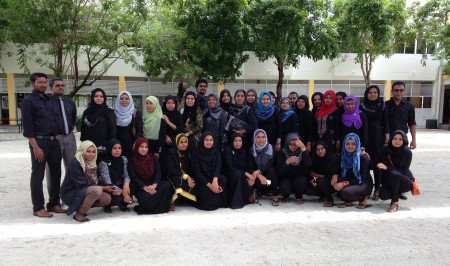The Maldives Civil Servants’ Association (MCSA) has discussed a potential strike on April 20 should the government fail to address its concerns – mainly concerning pay discrepancies.
“First we want to find a solution through dialogue with the government. After that, if we have to, we will go on strike. And we are confident if we go on strike ninety percent of civil servants will support it,” MCSA President Mohamed Shaugee said.
Stating that the past three governments and parliament should take responsibility for the delay in setting a minimum wage, Shaugee said “the state as a whole has failed”.
President Abdulla Yameen is concerned about the issue of pay discrepancies and will find a solution through discussions with relevant parties, President’s Office Spokesperson Ibrahim Muaz Ali has said today.
“This is not a president who makes decisions based on his personal views alone. There will be discussions. The views and sentiments of the civil servants, doctors, and everyone will be considered in reaching a decision in this matter,” said Muaz.
Civil Servants’ Strike
“Even the Civil Service Commission has failed to protect the rights of civil servants and ensure there is no discrimination [with regards to pay],” said the MCSA’s Shaugee.
“We have discussed this with them, and they said they are working on resolving it. But it is hard to believe as we have been talking about this for the past six years.”
Responding to the civil servants’ plans to go on strike, the Civil Service Commission (CSC) issued a press release today reminding workers of the mandatory steps to be taken prior to a strike, which include filing a complaint with the Labor Relations Authority and giving written notice to the employer three days prior to any strike.
Employees who contravene this regulation can be fined between MVR10,000 – 50,000.
The Teachers Association Maldives (TAM) which led the teachers’ black protest earlier this week has also threatened to go on strike as a last resort in their fight to resolve pay discrepancies.
President of the association Athif Abdul Hakeem said that, while no official discussions have taken place with the government since the protest, the teachers’ steering committee and focal points will meet this Friday to decide their course of action.
“We have been talking about [minimum wage] since the association was formed in 2008. We have been focusing on two major issues, one is resolving pay discrepancies. Equal pay. Second issue is improving the education sector in general, including resources, training and standards of teachers,” said President of TAM Athif Abdul Hakeem.
Athif noted that with parliament majority, the government can easily change things if there is a political will.
“If [President Yameen] wants to do those things for us, the means are there now. I believe it can be done and it should be done.
The demand for a minimum wage has been raised by Tourism Employees Association of the Maldives (TEAM) as well.
Minimum wage
The Employment Act of 2008 mandated the establishment of a salary advisory board shall be established to advise the government on the appropriate minimum wage, though no government has yet fulfilled this requirement.
The pay advisory board had been established in September 2008 by President Maumoon Abdul Gayoom and again in January 2009 by President Mohamed Nasheed, with no minimum wage resulting.
In May 2011, Nasheed announced his intention to set a minimum wage within a year, reconvening the pay advisory board.
Shortly after Nasheed’s initial promise, a number of business groups led by representatives of the Maldives Association of Construction Industry and the Maldives Association of Tourism Industry met to discuss the issue, determining that a minimum wage was “not important for the Maldives at the moment.”
Speaking at the press conference organised by the business groups, leader of the Jumhooree Party and Chairman of Villa Group Gasim Ibrahim said that setting a minimum wage suddenly without a good policy would destroy industry.
His thoughts were echoed by Ahmed Shiyam, Chairman of Sun Siyam resorts and leader of the Maldives Development Alliance.
Similar comments were made by current Deputy Leader of PPM Ahmed Adeeb, who at the time spoke as the treasurer of Maldives National Chamber Of Commerce and Industry.
Adeeb said that it would create great challenges for businesses if an equal minimum wage is set for both migrant workers and locals.
In December 2012, parliament passed a bill on the state wage policy which promised to resolve public sector pay discrepancies through the creation of a National Pay Commission.
The bill is still in the parliament’s economic committee, however, after being sent back for reconsideration by President Dr Mohamed Waheed, after issues were raised regarding which branch of the state would determine wages.
 (0)Dislikes
(0)Dislikes (0)
(0)